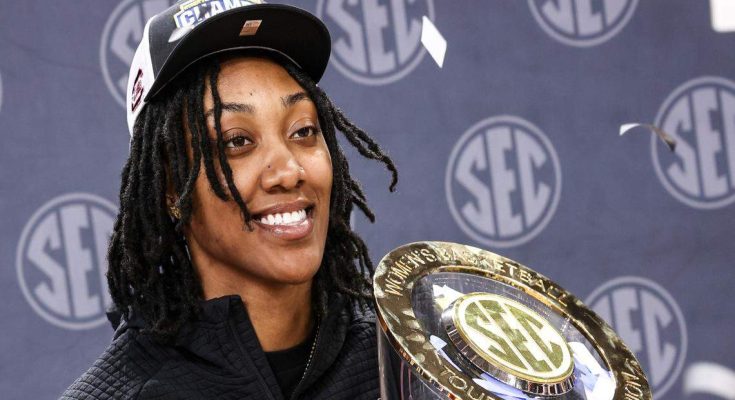When South Carolina women’s basketball fans envisioned the 2025–2026 season, they likely imagined Ashlyn Watkins patrolling the paint, swatting shots, slamming home dunks, and igniting the crowd at Colonial Life Arena. But on a quiet Tuesday morning, that vision was abruptly altered. In a heartfelt statement posted across her social media channels, Watkins stunned the Gamecock faithful by announcing she would be stepping away from basketball for the entirety of the upcoming season—a decision rooted in personal growth, mental health, and a desire to reset away from the spotlight.
Ashlyn Watkins’ announcement came as a surprise not just because of her undeniable talent but because of the timing. Entering her senior year, Watkins was poised to be a cornerstone of Dawn Staley’s squad, a player many believed could push the Gamecocks into yet another championship-contending campaign. Her vertical athleticism, elite rebounding ability, and rapidly improving offensive skill set made her a matchup nightmare and a fan favorite. She had already etched her name in South Carolina history as one of the few women to dunk in a college game. Her trajectory screamed WNBA lottery pick, and now, that journey is hitting pause.
In her statement, Watkins emphasized that the decision was not made lightly. She described feeling “overwhelmed” and “emotionally stretched” over the last year, despite the success of the team. She also made it clear that her love for basketball remains strong, but that right now, she needs to prioritize herself off the court. “I’ve been blessed with incredible opportunities through this game, but lately I’ve realized that I haven’t truly taken time to check in with me,” she wrote. “This isn’t goodbye—this is see you later.”
The announcement sent shockwaves through the college basketball world. Teammates, opponents, alumni, and analysts quickly flooded her comments section with support, praising her courage and prioritization of self-care. Coach Dawn Staley released a statement of her own shortly after, noting how proud she is of Watkins for making such a difficult yet mature decision. “Ashlyn is more than a player—she’s a young woman with wisdom beyond her years,” Staley said. “This is a family, and families lift each other up. We’ll be here when she’s ready.”
Staley’s words underscore a larger cultural shift in college athletics, where mental health is no longer swept under the rug but addressed openly. Watkins joins a growing list of high-profile athletes—from Simone Biles to Naomi Osaka to Caleb Love—who have stepped away to regroup, reset, and ultimately return stronger. In a sports environment where athletes are often judged solely by wins, stats, and hardware, Watkins’ move serves as a reminder that people exist beyond the jersey.
Still, there’s no denying that her absence leaves a significant hole in South Carolina’s roster. The 6’3” forward was expected to be a double-double machine and defensive anchor in the post. She had come off a strong junior campaign in which she averaged 9.6 points, 7.3 rebounds, and 2.1 blocks per game in just under 24 minutes per contest. More than the numbers, she brought energy, leadership, and a contagious tenacity that elevated everyone around her.
Now, the Gamecocks must adjust. Returning stars like MiLaysia Fulwiley and Chloe Kitts will shoulder more responsibility, and Staley will likely lean heavily on incoming freshmen and transfer portal additions to fill the frontcourt void. While South Carolina’s pipeline of elite talent ensures they will remain competitive, Watkins’ departure certainly shifts the team’s ceiling and dynamic. What was once expected to be a national title-or-bust season now becomes more of a transitional year—still full of promise, but requiring a recalibrated mindset.
But even more intriguing than what this means for South Carolina’s upcoming season is what it could mean for Watkins’ long-term path. Athletes who step away often return reinvigorated, with renewed clarity and purpose. If Watkins does come back for the 2026–2027 campaign, she would do so potentially as a graduate student, armed with not only elite athleticism but life perspective few players can match. It’s not hard to imagine her returning to dominate and then leap to the WNBA as one of the most emotionally and physically ready players in her class.
There’s also the broader implication of what her absence represents. College basketball has become a pressure cooker, especially for top programs like South Carolina that sit under a microscope year-round. NIL deals, constant media scrutiny, academic expectations, and the weight of team success can wear even the strongest down. Watkins stepping away might signal to other student-athletes that it’s okay to take a breath, to opt for health over heroics, and to prioritize long-term well-being over short-term accolades.
And in the end, that may be Ashlyn Watkins’ most important contribution to the sport—not the dunks or the blocks or even the championships, but the example she sets by stepping off the court when she needs to. In doing so, she challenges the notion that toughness means playing through everything. Instead, she reframes toughness as having the strength to say, “I need help,” or, “I need time.” That’s a kind of bravery often overlooked in athletics, but one that should be celebrated just as fiercely as buzzer-beaters and double-doubles.
That bravery is something those who know Watkins say has always been a part of her. Growing up in Columbia, South Carolina, she emerged as a high school phenom, leading Cardinal Newman School to multiple state titles. She became a local legend before ever stepping foot on the Gamecocks’ court, and when she committed to play for Dawn Staley, it felt like destiny. She was staying home to build something even more special. And she did—contributing immediately as a freshman and growing into a versatile, ferocious presence on both ends of the floor.
Her connection with the fan base grew each year, too. Watkins wasn’t just a highlight-reel athlete—though her soaring dunks certainly drew headlines—she was approachable, humble, and unselfish. She’d stay after games to sign autographs for kids, visit local schools to talk about mental health, and quietly mentor younger teammates behind the scenes. It’s clear that for Watkins, being a Gamecock was never just about basketball. It was about legacy, community, and purpose.
That’s what makes her announcement feel not like a retreat, but a realignment. Watkins is, in many ways, embodying the lessons that Coach Staley has long instilled in her players—that who you are matters more than what you do, and that basketball is a vehicle, not a definition. By stepping back, Watkins is embracing the kind of leadership that resonates far beyond the hardwood.
It’s still unclear exactly how Watkins will spend her time away. In her post, she mentioned plans to focus on academic work, personal relationships, and community projects that have long been on her heart. It’s possible she could stay connected to the team in some off-court capacity, perhaps as a mentor or informal advisor. Or she may disappear entirely from the spotlight to truly recharge in solitude. Whatever she chooses, she’s earned the right to do so without judgment or speculation.
As the college basketball season approaches, South Carolina will march on, as all programs must. But there will be a noticeable absence—not just in terms of points and rebounds, but in soul and spark. Still, for a program as tight-knit as the Gamecocks, this chapter is less about loss and more about support. Watkins’ jersey may hang in the locker, but her teammates know this journey is bigger than basketball.
And somewhere, away from the cameras and crowds, Ashlyn Watkins will be writing her next chapter—one that may not include box scores or buzzer-beaters but will undoubtedly be every bit as meaningful. Whether she returns in a year or charts an entirely new course, she’s already proven what kind of legacy she’s leaving behind. One not just measured in wins, but in wisdom.
In the coming months, as South Carolina battles on the court, Watkins will be battling in her own way—wrestling with growth, healing, and the kind of self-reflection most people never make time for. And maybe, just maybe, her story will inspire a new generation of athletes to do the same. Because sometimes the boldest move isn’t charging ahead. Sometimes, it’s having the strength to stop.



